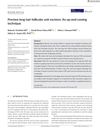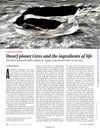 7 citations,
October 2018 in “Aesthetic Surgery Journal”
7 citations,
October 2018 in “Aesthetic Surgery Journal” The hairline lowering surgery with bone tunneling suture fixation is safe and effective, with high patient satisfaction.
 6 citations,
November 2021 in “Frontiers in immunology”
6 citations,
November 2021 in “Frontiers in immunology” STAT3 signaling is important for healthy skin and hair follicles, and its disruption can lead to skin conditions like atopic dermatitis.
 6 citations,
January 2010 in “Actas Dermo-Sifiliográficas”
6 citations,
January 2010 in “Actas Dermo-Sifiliográficas” Follicular Unit Hair Transplantation has become a less invasive procedure with natural results, suitable for certain adults with hair loss.
[object Object]  6 citations,
March 1999 in “Journal of pediatric health care”
6 citations,
March 1999 in “Journal of pediatric health care” The document emphasizes the need for primary care providers to understand and care for African American children's hair and skin to boost their self-esteem.
 4 citations,
January 2015 in “Hair therapy & transplantation”
4 citations,
January 2015 in “Hair therapy & transplantation” Hair follicle stem cells could be used to treat the skin condition vitiligo.
 3 citations,
December 2022 in “bioRxiv (Cold Spring Harbor Laboratory)”
3 citations,
December 2022 in “bioRxiv (Cold Spring Harbor Laboratory)” The research reveals how early embryonic mouse skin develops from simple to complex structures, identifying various cell types and their roles in this process.
 3 citations,
May 2021 in “Dermatologic Clinics”
3 citations,
May 2021 in “Dermatologic Clinics” The document concludes that more research is needed to understand hair loss in men and to find new treatments.
 3 citations,
February 2021 in “Journal of Cosmetic Dermatology”
3 citations,
February 2021 in “Journal of Cosmetic Dermatology” Long hair FUE, a hair transplant without shaving, is becoming more popular and surgeons should learn it.
 3 citations,
June 2006 in “Expert Review of Dermatology”
3 citations,
June 2006 in “Expert Review of Dermatology” The document concludes that hair loss is complex, affects many people, has limited treatments, and requires more research on its causes and psychological impact.
 3 citations,
September 2005 in “Experimental dermatology”
3 citations,
September 2005 in “Experimental dermatology” The cornified envelope is crucial for skin's barrier function and involves key proteins and genetic factors.
 2 citations,
August 2022 in “Emergency medicine international”
2 citations,
August 2022 in “Emergency medicine international” Keloid skin disorder involves abnormal fibroblast activation and immune response, linked to a group of genes including FGF11.
 2 citations,
June 2020 in “Journal of Cosmetic Dermatology”
2 citations,
June 2020 in “Journal of Cosmetic Dermatology” Microneedling with minoxidil improved hair growth in elderly man.
 2 citations,
July 2018 in “Elsevier eBooks”
2 citations,
July 2018 in “Elsevier eBooks” Some supplements may help with hair loss, but there's not enough strong evidence to recommend them without doctor advice.
 2 citations,
February 2017 in “Science”
2 citations,
February 2017 in “Science” The Dawn spacecraft found that Ceres has complex organic molecules and a lot of water ice, hinting it might support life.
[object Object]  2 citations,
January 2014 in “Springer eBooks”
2 citations,
January 2014 in “Springer eBooks” The book details skin conditions in older adults, their link to mental health, cancer treatment importance, hair loss remedies, and managing autoimmune and itchy skin.
 2 citations,
July 1998 in “Dermatologic Clinics”
2 citations,
July 1998 in “Dermatologic Clinics” European dermatologic treatments focus on lifestyle and psychosocial factors, use diverse methods like baths and climate therapy, and emphasize the importance of diet and supplements for skin health.
 1 citations,
March 2023 in “bioRxiv (Cold Spring Harbor Laboratory)”
1 citations,
March 2023 in “bioRxiv (Cold Spring Harbor Laboratory)” Skin cell types develop when specific genes are turned on by removing certain chemical tags from DNA.
 1 citations,
April 2019 in “Journal of Investigative Dermatology”
1 citations,
April 2019 in “Journal of Investigative Dermatology” Patients with autoimmune blistering diseases experience a reduced quality of life, with the need for better measurement tools, especially for those with mucous membrane pemphigoid.
 1 citations,
October 2018 in “Operative techniques in otolaryngology--head and neck surgery”
1 citations,
October 2018 in “Operative techniques in otolaryngology--head and neck surgery” New techniques can effectively treat aging around the eyes.
 1 citations,
October 2017 in “Dermatologic Clinics”
1 citations,
October 2017 in “Dermatologic Clinics” Men are increasingly using energy-based skin treatments for workplace success, with lasers and other devices effectively improving skin and body appearance.
 1 citations,
May 2017 in “InTech eBooks”
1 citations,
May 2017 in “InTech eBooks” Some cosmetic procedures show promise for treating hair loss, but more research is needed to confirm their safety and effectiveness.
 1 citations,
January 2013 in “Springer eBooks”
1 citations,
January 2013 in “Springer eBooks” Cosmeceuticals may benefit skin health but need more research for efficacy and safety confirmation.
 1 citations,
January 2006 in “Elsevier eBooks”
1 citations,
January 2006 in “Elsevier eBooks” The conclusion is that different types of hair loss in dogs and cats can be cosmetic or serious, and affected animals should not be bred.

Stem cell therapy shows promise for treating hair loss in androgenetic alopecia.
 January 2024 in “Frontiers in immunology”
January 2024 in “Frontiers in immunology” Histone modification is key in treating chronic inflammatory skin diseases.
 December 2023 in “International Journal of Medical Arts”
December 2023 in “International Journal of Medical Arts” Transplanted hair follicles show significant changes after FUE, needing more research.
 August 2023 in “Research Square (Research Square)”
August 2023 in “Research Square (Research Square)” Two microRNAs affect hair follicle development in sheep by targeting specific genes.
 September 2022 in “Frontiers in genetics”
September 2022 in “Frontiers in genetics” A Chinese male with a new genetic mutation has a skin condition and severe urinary issues, with treatments having mixed success.
 July 2021 in “Journal of dermatology research and therapy”
July 2021 in “Journal of dermatology research and therapy” Using combined treatments can help manage acne by targeting the bacteria and skin changes that cause it.

PlacMA hydrogels from human placenta are versatile and useful for cell culture and tissue engineering.






























